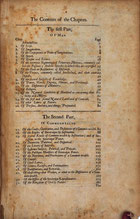Quotes from book
Leviathan

Leviathan or The Matter, Forme and Power of a Common-Wealth Ecclesiasticall and Civil, commonly referred to as Leviathan, is a book written by Thomas Hobbes and published in 1651 . Its name derives from the biblical Leviathan. The work concerns the structure of society and legitimate government, and is regarded as one of the earliest and most influential examples of social contract theory. Leviathan ranks as a classic Western work on statecraft comparable to Machiavelli's The Prince. Written during the English Civil War , Leviathan argues for a social contract and rule by an absolute sovereign. Hobbes wrote that civil war and the brute situation of a state of nature could only be avoided by strong, undivided government.

“Life is nasty, brutish, and short”
The First Part, Chapter 13, p. 62.
Leviathan (1651)
Variant: And the life of man solitary, poore, nasty, brutish, and short.
Context: Whatsoever therefore is consequent to a time of Warre, where every man is Enemy to every man; the same is consequent to the time, wherein men live without other security, than what their own strength, and their own invention shall furnish them withall. In such condition, there is no place for Industry; because the fruit thereof is uncertain: and consequently no Culture of the Earth; no Navigation, nor use of the commodities that may be imported by Sea; no commodious Building; no Instruments of moving, and removing things as require much force; no Knowledge of the face of the Earth; no account of Time; no Arts; no Letters; no Society; and which is worst of all, continuall feare, and danger of violent death; And the life of man solitary, poore, nasty, brutish, and short.

The Second Part, Chapter 26, p. 143.
Leviathan (1651)
Context: The Interpretation of the Laws of Nature in a Common-wealth, dependeth not on the books of Moral Philosophy. The Authority of writers, without the Authority of the Commonwealth, maketh not their opinions Law, be they never so true.

“So that every Crime is a sinne; but not every sinne a Crime.”
The Second Part, Chapter 27, p. 151
Leviathan (1651)

“and where men build on false grounds, the more they build, the greater is the ruine:”
The Second Part, Chapter 26, p. 140
Leviathan (1651)

The First Part, Chapter 11, p. 47.
Leviathan (1651)
Context: So that in the first place, I put for a general inclination of all mankind a perpetual and restless desire of Power after power, that ceaseth only in Death. And the cause of this is not always that a man hopes for a more intensive delight than he has already attained to, or that he cannot be content with a moderate power: but because he cannot assure the power and means to live well, which he hath present, without the acquisition of more.

The Elements of Law, Natural and Politic Pt. I Human Nature (1640) Ch. 9
Source: Leviathan

This is the sentence that dug the grave of philosophy in the nineteenth century. … This sentence brings to an end the tradition of a knowledge that, as its name indicates, was an erotic theory—the love of truth and the truth through love (Liebeswahrheit). … Those who utter the sentence reveal the truth. However, with the utterance they want to achieve more than truth: They want to intervene in the game of power.
Source: Kritik der zynischen Vernunft [Critique of Cynical Reason] (1983), p. xxvii
Source: Leviathan

“For it can never be that war shall preserve life, and peace destroy it.”
Source: Leviathan

The Fourth Part, Chapter 47, p. 386(See also: Arnold J. Toynbee, A Study of History, Volume I)
Leviathan (1651)

“Fact be vertuous, or vicious, as Fortune pleaseth;”
The Second Part, Chapter 27, p. 153
Leviathan (1651)

“And as in other things, so in men, not the seller, but the buyer determines the Price.”
The First Part, Chapter 10, p. 42
Leviathan (1651)